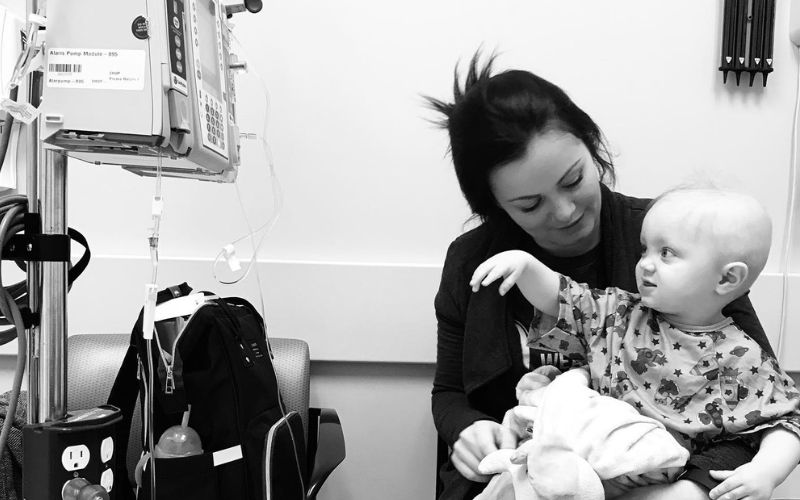
By: Trish Adkins
Matteo was just six months old when childhood cancer entered his life.
His parents, Kim and Alfred, were already aware of childhood cancer. Al’s employer was a sponsor of Alex’s Lemonade Stand Foundation (ALSF). The night before Matteo was diagnosed, Kim had stayed up late baking cookies for a fundraiser at his office.
"Never in a million years did I think my kid would have cancer,” said Kim, “We knew about childhood cancer. But we did not think it would be us.”
Childhood cancer is devastating.
Matteo was diagnosed with a pediatric kidney cancer called cellular congenital mesoblastic nephroma. Pediatric kidney cancer is already rare, but Matteo’s tumor was even rarer and accounted for less than five percent of all kidney cancers in children. His initial treatment was surgery to remove the tumor and one of his kidneys.
Everyone was hopeful.
Then three months later, a routine follow-up scan showed a recurrence of the tumor. This time it was in his lungs. Again, Matteo endured surgery. He also began chemotherapy.
Today, years after his initial diagnosis, Matteo is cancer-free. His family remains involved with ALSF — participating in The Million Mile during September’s Childhood Cancer Awareness Month.
“We are navigating through childhood cancer by choosing lemonade,” said Kim. "Giving back to ALSF and helping fund research gives us something good to do with all the hard things cancer gave us.”
Childhood Cancer Awareness Month comes just once a year each September, but for families like Matteo’s, childhood cancer awareness is a daily drumbeat. That’s why it’s so important to spread the word about this disease and the importance of safer, more effective treatments to help all kids. Here are six facts you can share this September and beyond.
1. Childhood cancer is a genetic change to a single cell.
Childhood cancer begins with a genetic change to a single cell, which then grows out of control, impacting healthy cells and systems of the body. This out-of-control growth is called a tumor and tumors can appear anywhere in the body.
2. Childhood cancer is not one disease but dozens.
Childhood cancer is a general term for a group of diseases. There are dozens of types of childhood cancer and countless subtypes ranging from kidney cancers, like Matteo had, to the most common type of childhood cancer like leukemia.
3. Childhood cancer is not the same as adult cancer.
While cancer names and types like leukemia or lymphoma may share a name with adult cancers, childhood cancers are different and often require different treatments. The average age at diagnosis for a child with cancer is 10 years old (for an adult it is 66 years old).
Children’s bodies are still growing and developing, which makes the risk of side effects from treatment even greater. Children who have had childhood cancer treatment are 95% more likely than their peers without a past cancer diagnosis to experience a significant health side effect by the time they are 45 years old.
4. Childhood Cancer is deadly, but there is hope.
Childhood cancer is the leading cause of death by disease in children in the United States. Several years ago, brain tumors surpassed leukemia as the deadliest form of childhood cancer, accounting for 30% of all childhood cancer deaths.
Brain tumors did not become more deadly — but instead, research and innovations in treatments have led to a 90% cure rate for the most common types of leukemia. Research is the hope for all children facing a childhood cancer diagnosis.
5. Childhood Cancer is considered rare.
Each year in the United States, 17,000 children are diagnosed with cancer. While this number seems low as compared to adult cancer, the World Health Organization estimates that childhood cancer stole 11.5 million years of healthy life away from children in 2017.
6. Childhood cancer research is consistently underfunded.
In the past 20 years, science has made great strides in treating childhood and adult cancers. However, childhood cancer continues to receive just a small portion of the federal research budget dedicated to cancer research. To bridge the gap, Alex’s Lemonade Stand Foundation has continued to invest in innovative, cutting-edge research, including the Crazy 8 Initiative. The Crazy 8 Initiative provides $26 million in funding to six game-changing, collaborative projects at 21 institutions in the United States and Europe.
Need help explaining childhood cancer to children? Alex’s Lemonade Stand Foundation has several resources to help. Check out our section on talking to kids about cancer on our website. You can also get ideas with ways to get children, schools and families involved in the search for cures.


